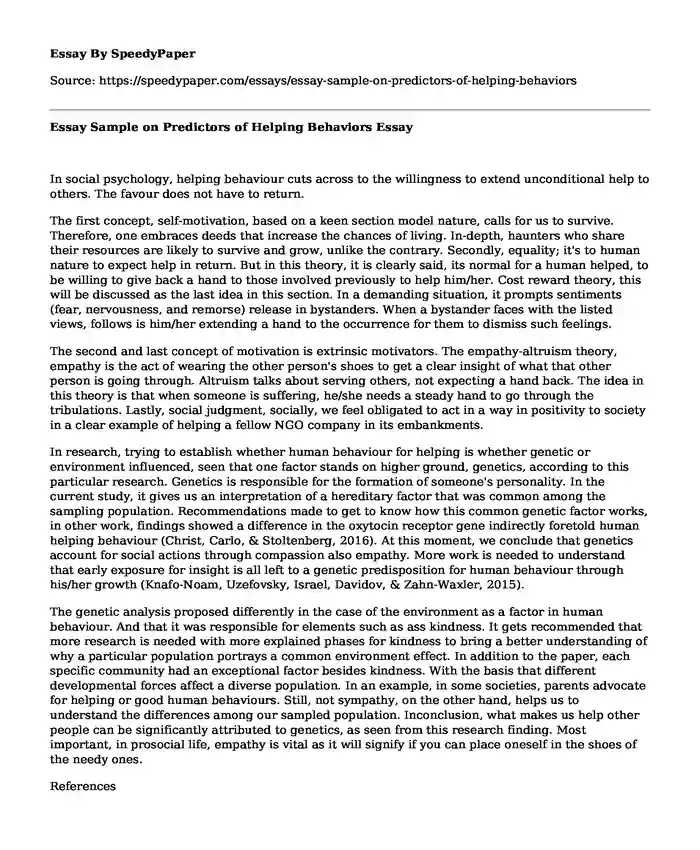
| Type of paper: | Essay |
| Categories: | Human behavior |
| Pages: | 3 |
| Wordcount: | 609 words |
In social psychology, helping behaviour cuts across to the willingness to extend unconditional help to others. The favour does not have to return.
The first concept, self-motivation, based on a keen section model nature, calls for us to survive. Therefore, one embraces deeds that increase the chances of living. In-depth, haunters who share their resources are likely to survive and grow, unlike the contrary. Secondly, equality; it's to human nature to expect help in return. But in this theory, it is clearly said, its normal for a human helped, to be willing to give back a hand to those involved previously to help him/her. Cost reward theory, this will be discussed as the last idea in this section. In a demanding situation, it prompts sentiments (fear, nervousness, and remorse) release in bystanders. When a bystander faces with the listed views, follows is him/her extending a hand to the occurrence for them to dismiss such feelings.
The second and last concept of motivation is extrinsic motivators. The empathy-altruism theory, empathy is the act of wearing the other person's shoes to get a clear insight of what that other person is going through. Altruism talks about serving others, not expecting a hand back. The idea in this theory is that when someone is suffering, he/she needs a steady hand to go through the tribulations. Lastly, social judgment, socially, we feel obligated to act in a way in positivity to society in a clear example of helping a fellow NGO company in its embankments.
In research, trying to establish whether human behaviour for helping is whether genetic or environment influenced, seen that one factor stands on higher ground, genetics, according to this particular research. Genetics is responsible for the formation of someone's personality. In the current study, it gives us an interpretation of a hereditary factor that was common among the sampling population. Recommendations made to get to know how this common genetic factor works, in other work, findings showed a difference in the oxytocin receptor gene indirectly foretold human helping behaviour (Christ, Carlo, & Stoltenberg, 2016). At this moment, we conclude that genetics account for social actions through compassion also empathy. More work is needed to understand that early exposure for insight is all left to a genetic predisposition for human behaviour through his/her growth (Knafo-Noam, Uzefovsky, Israel, Davidov, & Zahn-Waxler, 2015).
The genetic analysis proposed differently in the case of the environment as a factor in human behaviour. And that it was responsible for elements such as ass kindness. It gets recommended that more research is needed with more explained phases for kindness to bring a better understanding of why a particular population portrays a common environment effect. In addition to the paper, each specific community had an exceptional factor besides kindness. With the basis that different developmental forces affect a diverse population. In an example, in some societies, parents advocate for helping or good human behaviours. Still, not sympathy, on the other hand, helps us to understand the differences among our sampled population. Inconclusion, what makes us help other people can be significantly attributed to genetics, as seen from this research finding. Most important, in prosocial life, empathy is vital as it will signify if you can place oneself in the shoes of the needy ones.
References
Christ, C. C., Carlo, G., & Stoltenberg, S. F. (2016). Oxytocin receptor (OXTR) single nucleotide polymorphisms indirectly predict prosocial behaviour through perspective-taking and empathic concern. Journal of personality, 84(2), 204-213.
Knafo-Noam, A., Uzefovsky, F., Israel, S., Davidov, M., & Zahn-Waxler, C. (2015). The prosocial personality and its facets: the genetic and environmental architecture of mother-reported behaviour of 7-year-old twins. Frontiers in psychology, 6, 112.
Cite this page
Essay Sample on Predictors of Helping Behaviors. (2023, Mar 16). Retrieved from https://speedypaper.com/essays/essay-sample-on-predictors-of-helping-behaviors
Request Removal
If you are the original author of this essay and no longer wish to have it published on the SpeedyPaper website, please click below to request its removal:
- Essay Example: Election Effect on Stock Market
- Iconographical Representation of My Life. Personal Essay Example.
- Free Essay Example on Marketplace of Ideas Rationale
- Microbial Research Paper Sample on Tea Tree Oil
- Essay Example on Cyber Defense Methods
- The Real Nature of Love Essay Sample
- Monarchy Is the Best Form of Government
Popular categories




